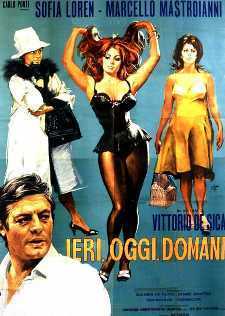Plot
Adelina of Naples
In 1954, in the working-class Naples district of Forcella, Adelina supports her unemployed husband Carmine and their child by selling black market cigarettes in the street while pregnant with their second child. When her furniture is to be repossessed due to an unpaid fine, her neighbours assist her by hiding the furniture. A local lawyer warns Carmine that, since the fine and furniture are under Adelina's name, she will be imprisoned. However, Italian law stipulates that women cannot be imprisoned while pregnant or within six months after the delivery. Armed with this information, Adelina schemes to stay pregnant continuously.
After seven children in eight years, Carmine becomes too exhausted to perform sexually and Adelina nearly resorts to being impregnated by their mutual friend Pasquale, but decides against it. She then turns herself in, and the whole neighbourhood gathers money to free her and petition for her pardon, which eventually occurs and she is reunited with Carmine and their children.
Anna of Milan
While her wealthy industrialist husband is on a business trip to Stuttgart, bored Milanese housewife Anna picks up her lover Renzo, a lower-class writer, in her husband's Rolls-Royce for a drive in the countryside. She feels neglected by her husband, who, according to her, only cares about work and money. On the drive, Anna allows Renzo to take the wheel of the Rolls-Royce, and while she seductively proposes that they run away together that night, he swerves to avoid a young boy selling flowers by the roadside and crashes the car into a tractor. Infuriated by the damage to her Rolls-Royce, Anna hitches a ride home with a passing motorist, leaving Renzo by the side of the road. After begrudgingly buying a bouquet of flowers from the boy, Renzo throws the flowers away as he walks away.
Mara of Rome
- Written by Cesare Zavattini
Mara works as a prostitute from her rooftop apartment overlooking Piazza Navona, servicing a variety of regular high-end clients including Augusto, the wealthy, powerful and neurotic son of a Bologna industrialist. One evening, Mara befriends Umberto, a handsome and callow young man studying for the priesthood but not yet ordained, who is visiting his grandparents in the adjacent apartment. Embarrassed to disclose her real occupation, she tells him that she is a manicurist. Umberto's strict grandmother sees them talking and, knowing that Mara is a prostitute, interrupts their conversation, telling Mara that she will go to hell and threatening to start a petition to have her evicted from the building. Umberto protests, but Mara defends herself.
The next day, Umberto's distraught grandmother visits Mara and informs her that her grandson, who is infatuated with Mara, is willing to renounce his priesthood to be with her. Sympathetic, Mara vows to set Umberto on the path of righteousness back to the seminary and, if she succeeds, she will take a vow of celibacy for a week. When Umberto argues with his grandparents and threatens to join the French Foreign Legion, Mara goes over to their apartment, with the reluctant Augusto in tow, and finally persuades Umberto to return to the seminary, earning his grandmother's gratitude. Mara rewards Augusto with a striptease but stops as she remembers her week-long vow. Frustrated, Augusto prepares to leave, but Mara convinces him to stay and pray with her.
Production
The production of Yesterday, Today and Tomorrow took place in various locations across Italy. Each of the three segments was shot in different settings, reflecting the diverse cultural and social landscapes of the country. The first segment is set in Naples and follows the story of Adelina. The second story is set in Milan and revolves around the character of Anna. The final segment is set in Rome and centers on Mara.
The "Adelina" segment is based on the true story of Concetta Muccardi, a Neapolitan street vendor of contraband cigarettes who had 19 pregnancies to avoid going to prison. Muccardi died on 21 November 2001 at the age of 78, by which time five of her children were still alive. [5]
For her striptease scene in the "Mara" segment, Loren was coached by Jacques Ruet, choreographer for the Crazy Horse. [6]
Reception
Box office
Yesterday, Today and Tomorrow grossed $9.3 million in North America, becoming the third highest-grossing Italian film at the time, behind La Dolce Vita and 8½ . [2] The film brought home $8 million in proceeds for Carlo Ponti's company. [7]
Critical response and legacy
John Simon of The New Leader described Yesterday, Today and Tomorrow as an "overrated dud", [8] while Brendan Gill of The New Yorker referred to it, in passing, as a "club sandwich." [9] Bosley Crowther, in The New York Times , found it a "wonderfully elaborated burlesque." [10] For Variety , the objects of "this breezy, non-cerebral, three-episoder," are "the wonders of Italy and Sophia Loren." It's a film, it reads, directed with "cinematic flair and invested with sensual gusto." [11]
On the Rotten Tomatoes review aggregator, the film holds an approval rating of 78%, based on 9 reviews, with an average rating of 7.3/10. [12]
In 2015, Sophia Loren's autobiography was published, under the title Yesterday, Today and Tomorrow: My Life. [13] In 2021, Jacek Górecki's retrospective view of De Sica's oeuvre in Gazzetta Italia was similarly titled "Ieri, oggi, domani." [14]
This page is based on this
Wikipedia article Text is available under the
CC BY-SA 4.0 license; additional terms may apply.
Images, videos and audio are available under their respective licenses.
